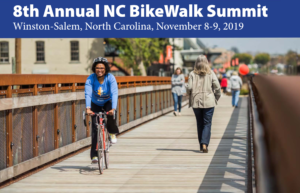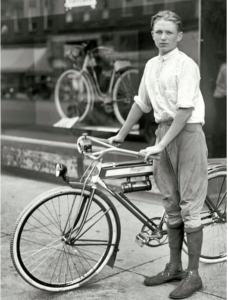We wanted to let you all know that we are so very excited to announce our 8th Annual North Carolina BikeWalk Summit!
BikeWalkNC and its partners would like to invite you to be a part of the 2019 NC BikeWalk Summit which will take place November 8-9, 2019 in Winston-Salem North Carolina. We are currently accepting proposals from people, organizations or partnerships who would like to talk about how they are making how we can make “Healthy, Active Communities with a carbon free transportation future!”
The 2019 NC BikeWalk Summit is the proud to be in Winston-Salem for the first time!. We want you to help us tell the story of our present state of active transportation, all that has changed and lay out a vision for North Carolina. Please submit a proposal for a panel, workshop, mobile workshop or poster. You can propose your own panel, or a single presentation and BikeWalkNC will select the best.
To help get you started, we are looking for proposals that address the following themes:


